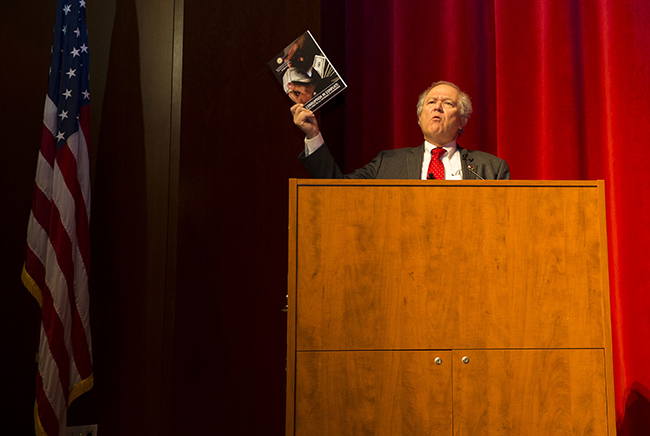
John Sopko, the Special Inspector General for Afghanistan Reconstruction, speaks at the Marine Corps University on Marine Corps Base Quantico, Va., March 23, 2018. Marine Corps photo by Cpl. Robert Gonzales.
How is the US-led effort going in Afghanistan? For the most part, that is classified. And needlessly so, according to the top US watchdog for Afghanistan reconstruction.
“Almost every indicia, metric for success or failure, is now classified or non-existent,” John Sopko, the Special Inspector General for Afghanistan Reconstruction, told reporters in Washington, D.C. “Over time it has been classified, or it’s no longer being collected.”
Specifically, the Afghan government no longer publicly releases figures for casualties of its forces. Also, SIGAR cannot publicly release the districts that are in Taliban control or Afghan government control. These are figures that show how stable, or unstable, the Afghan government is with US and NATO support and broadly show the effectiveness of 17 years of war.
SIGAR historically had released a breakdown of Afghan districts that were under Taliban control, but has recently been blocked from doing so, Sopko said. These figures are now in the classified annex of his quarterly reports for US government leaders, the latest of which is expected next week.
This decision in particular does not make sense, and only serves to hide bad news, Sopko said. “Governments usually don’t classify good news,” he said.
“I don’t think it makes sense. The Afghan people know which districts are controlled by the Taliban,” he said. “The Taliban obviously know which districts they control. Our military knows. Everybody in Afghanistan knows it. The only people who don’t know what’s going on are the people who are paying for all of this, and that’s the American taxpayer.”
Hiding too much information about the ongoing war effort breeds suspicion and cynicism, which is dangerous for a war that is now largely out of the public’s eye.
It is a pivotal time for the US effort, as American negotiators are working on a possible peace agreement with the Taliban. Additional information and understanding of the conflict by the public is important to avoid it becoming another “forgotten war,” he said. Additionally, policymakers need to ensure they are adequately planning for what could come next to ensure that everything that has been spent has not been wasted.
“There’s still Americans dying there; 2,400 Americans died. We’ve spent close to a trillion dollars in Afghanistan,” he said. “All of it is at risk if we screw up on the day after a peace agreement.”
